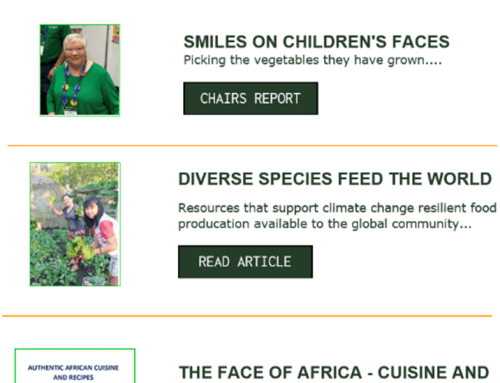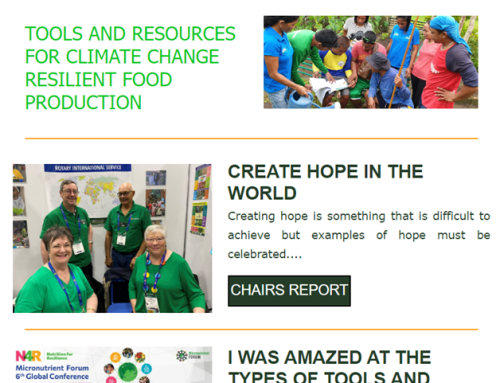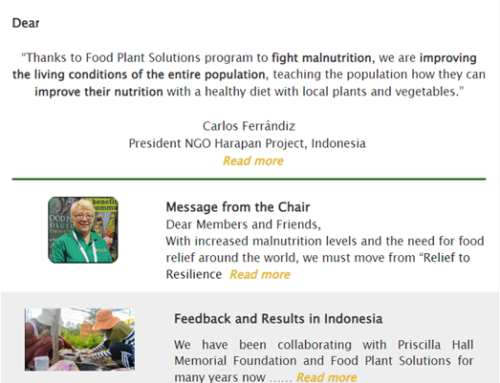In our January edition – ‘Nutritious food a human right’, we celebrate Bruce French’s amazing achievement of over 30,000 edible plants for his Food Plants International database, and have project updates on Papua New Guinea and Teacher in a Box.
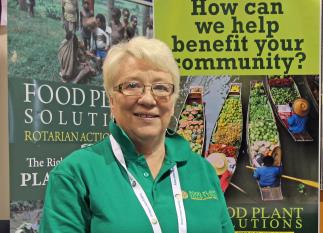
Message from the Chair
A new year has begun – a year we continue to “be the inspiration”! I hope that you all had a great time with family and friends and a break away from daily chores. Best wishes for 2019.
In the first half of this rotary year we have received requests from:
- Muravah Foundation in the Philippines for our 4 picture guides, (having created a field guide previously). It is an interesting time in the Philippines as the President has decreed that all Captains of Barangays must establish a communal garden in their areas. So, the need for production and printing will be high this year. I have written to Director Rafael Garcia who has agreed to follow this up with the Foundation and the Captains of Barangays.
- Nepal – DEPROSC-N have requested our 4 picture guides.
- Rwanda – The Mustard Seed Institute have requested 4 picture guides. One has been created and we are in the process of creating the second.
- Burundi- ESAFF Burundi have requested a field guide and our 4 picture guides.
- Tanzania – Africa Malaika, following the creation and translation of a field guide, have requested our 4 picture guides.
As you can see, this proves we are getting the message out to countries in need, but it is tinged for me with a question. How are we going to raise the money for these? We would welcome any ideas and activities in your areas to help us with this problem.
Maybe you, your club or district would like to join us in supporting any of these projects. Maybe you know a business who would like to be part of Food Plant Solutions RAG. Please let us know. We would love to fulfil these requests before the end of the financial year. Thank you.
I know that working together Rotarians can, and do, change people’s lives every day.
Continue to “be the inspiration” this Rotary Year.
Yours in Rotary
PDG Una Hobday, Chair Food Plant Solutions

Nutritious Food a Human Right
In their report “2018 – The State of Food Security and Nutrition in the World”, FAO have said “Access to safe, nutritious and sufficient food must be framed as a human right, with priority given to the most vulnerable. Policies must pay special attention to the food security and nutrition of children under five, school-age children, adolescent girls and women in order to halt the intergenerational cycle of malnutrition. A shift is needed towards nutrition-sensitive agriculture and food systems that provide safe and high quality food, promoting healthy diets for all.”
We know that girls who are born malnourished and become stunted as children, will often become malnourished mothers and the cycle then repeats itself. This cycle can be broken – empowering women through education so that they understand what nutritious food is, why their bodies need it and how to access it.
We seek your support to enable us to continue our vital work.
- Make a donation – https://foodplantsolutions.org/donate/
- Introduce us to possible donors / sponsors.
- Start a program.
- Include us in an existing program.
Milestone – 30,000 Plants!
Milestone – 30,000 Plants!
Bruce French – Officer of the Order of Australia
I have always said (jokingly) that when I get to 30,000 edible plant species I will retire. That number is what the most reliable sources such as FAO have said occur around the world. The current number in our Food Plants International database is 30,582 so I should have retired a few weeks ago.
I continue to be fascinated by the rich diversity of edible plants adapted to every location in the world that are being ignored. Instead our ‘western’ focus still remains on how to try to squeeze increased yields out of the unsustainably narrow varieties of a few species that specialists have focused on in recent years.
As an aside, the form of malnutrition called obesity is now becoming a global crisis. A narrow diet can never meet our body’s nutritional requirements. Most of the top international reports are saying that this approach is no longer viable and for the good of the planet and as the only hope for feeding our world, we need to re-think our approach to agriculture.
Increasingly, I find that some of the most useful articles and books that I read, have been produced by people who have lived and worked in the majority world at some stage in their career. In my recent lecture to Davis Campus of the University of California I suggested that in proportion to their population, the USA should get a mention in the world news once every 3 weeks. It is very hard to see ourselves in perspective and harder still to be prepared to re-think long held views and approaches.
I am impressed by the quality and caliber of those committed to finding solutions for feeding our ever-increasing world population in an ecologically sound way. Then global climate change and the global energy crisis will simply pass into history as minor distractions as all people around the world can learn to eat well.
Editor’s Note: The Food Plant Solutions team congratulates Bruce on his incredible achievement – over 30,000 edible plants in the Food Plants International database. It’s an honour to work with Bruce.
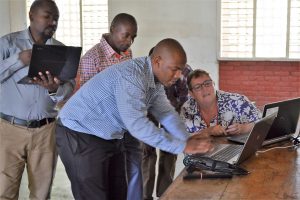
Teacher in a Box
In 2012, during a trip to Tanzania, Rotarian Jeanette Johnstone was confronted by the lack of opportunity available to the local people and surprised by the large number of cheap smart phones in use. She returned home to investigate ways where simple technology could be used to overcome barriers to accessing quality education. Partnering up with an IT student, Patrick Hackett, Teacher in a Box (TIB) was born with the assistance of IT networker Chris Hoyland.
Partnering with not-for-profit organisations such as World Possible, Learning Equality and Food Plant Solutions, Teacher in a Box provides people with offline access to an extensive range of FREE educational and training materials via any Wi-fi enabled device. No Internet is required!!
Supporting self-paced learning as well as classroom teaching, Teacher in a Box servers have a positive impact in places where there are limited teaching resources or teachers with limited training or education. All that is required is electricity and a secure place to store the server.
Since returning from Tanzania, the Teacher in a Box project team has assisted other Rotary clubs and not for profit organisations to deploy Teacher in a Box in many other regions including Papua New Guinea, the Philippines, Kenya, Liberia, Timor Leste and Cambodia.
Food Plant Solutions publications are on the TIB server, with feedback from a school in Tanzania recently advising “one of the resources they have used, has helped with the success of their own vegetable farm that they have created to provide fresh food for the meals they provide their 200 students. He said they had used soil improvement, pest eradication and disease recognition and eradication information from the Food and Plant Solutions site on Teacher in a Box”.
For further information contact info@foodplantsolutions.org or visit www.teacherinabox.org.au

Alleviation of Malnutrition in PNG Update
Dr Russ Stephenson has completed the first phase of what is a 3 year project. The Train-The-Trainer Workshop on Healthier, Stronger, Smarter Babies (Alleviation of Malnutrition) was held at Mougulu from the 26th October to the 9th November 2018. A humanitarian nutrition worker from CARE International was sent from Mt Hgen to participate in the workshop and with Dr Stephenson commenced malnutrition surveys. The survey was continued after Dr Stephenson left PNG, with an additional 617 children surveyed since November. Dr Stephenson is now analysing the survey data, which will be invaluable.
The workshop commenced with the aim to empower through education, enabling participants to understand the link between nutrition and good health. It was planned for 30 participants but ended up with just under 60!
One young man, a year 12 student, travelled 3 days to get to Mougulu from Mendi. The last part of his journey on foot, departing from Como to Dodomona and then to Mougulu, walking 2 days through the night to get there. Where there was once a road for him to travel on, the road was buried under massive landslips, making the journey treacherous. Despite this, he had a big smile on his face when he arrived. Inspirational.
Because the workshop was taught in a second or third language, it involved a lot or repetition to ensure important information was emphasized.
Upon completion, Certificates of Achievement were presented to all participants.
You can follow the progress of this project on Facebook.
Why Food Plant Solutions is Unique
We approach aid quite differently to most aid organisations:
We’d like to cease to exist because we were no longer needed. Sadly, we are a long way from that.
We are very low cost. All general donations go solely towards the project.
We never send people in-country but instead form partnerships with existing aid providers who use our publications to educate communities, and particularly women and children, on the nutrient value of their local food plants. Most projects (whether they be housing, water, schools, maternal health, etc.), would be further enhanced by adding a Food Plant Solutions component to them. People who are in dire situations require a sustainable way to grow and access nutritious food.
Our approach is proven to work. We have seen program partners reduce malnutrition in children by as much as 95%.
We need your help to raise funds so that we can continue this work. We ask that you please share this email with your vast network of connections.
And, if you can, please donate now


